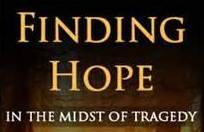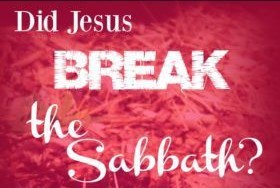When it comes to attempting to give understanding to difficult biblical passages, Hebrews 6:1-12 would be at the top of the list of verses, taxing the exegetical capabilities of most expositors. Of Hebrews chapter six, theologian R.W. Dale writes, “I know how this passage has made the heart of many a good man tremble. It rises up in the New Testament with a gloomy grandeur, stern, portentous, awful, sublime, as Mount Sinai when the Lord descended upon it in fire, and threatening storm-clouds were around Him, and thunderings and lightnings and unearthly voices told that He was there.”[1]
The number of interpretations which have been given in seeking to explain these verses for the purpose to help enlighten the student of Scripture, rival the number of stars in the heavens! It is not the intent of this writer to examine the various interpretations that have been put forth, one can find those interpretations elsewhere. Plus, it would take more pages to examine each one than the reader has time to read. The purpose here is a narrow one: to attempt to explain the interpretation that is the most satisfactory to this writer. May it be said, of the most acceptable interpretations of these verses each have their strong points, as well as their weak ones. In difficult passages, an expositor, through diligent study, arrives at an interpretation which doesn’t contradict Scripture, that seems to best fit the context, and seems most satisfactory in the scope of Spiritual understanding. One must admit, one’s Calvinistic or Arminian leanings often colors one’s approach of interpretation. With all that said, let’s seek to dive into the deep waters of this inspired text.
It is always important to examine the meaning of a passage in its context. To do otherwise can take one down a rabbit trail to paths unknown! It would prove beneficial in one’s understanding of the verses under consideration, to examine the audience to whom the author is writing and some background information that leads up to the text undertaken.
The author’s audience are Hebrew Christians who have made a profession of faith in Christ, but are struggling with lapsing back into Judaism and the sacrificial system. This indicates that Hebrews was written before 70 A.D., before the Temple was destroyed by the Roman General, Titus. Of course, no doubt there were others being addressed, such as those on the verge of making a decision for Christ. In leading up to chapter 6, the author is exhorting these Hebrew Christians not to revert back into an imperfect system that was types and shadows, when Christ is the perfect sacrifice and the fulfillment of the types and shadows the sacrificial system foreshadowed.
Like a skilled debater, in leading up to chapter 6 the author seeks to logically show the supremacy and superiority of Christ over the prophets, angels, Moses, Joshua, and the Levitical priesthood. To these Hebrew Christians, the author is addressing their stunted spiritual growth, and as chapter 5 comes to a close (5:11-14), it is clear he is addressing Christians. He encourages them to press on to maturity. The author desires to teach them deep truths but they are “dull of hearing” (5:11). The Greek word is nothros, meaning sluggish, lazy, that which has lost its excitement, has lost its momentum.[2] Their problem was not an imperfect or inadequate message or empty teaching, but their own “dull” hearing. The author tells them they ought to be teachers by now, but instead they are still being taught and stuck on the ABCs of the faith (5:12). The author also tells these Hebrew Christians they should be chewing on strong biblical “meat” but instead they are still drinking milk, which is the mark of babyhood or one who has yet to mature in the faith (5:12-13). In no uncertain terms the author tells them they are still babes (5:13) and they need to grow to mature faith (5:14). They were yet “unskilled” (5:13), the Greek word apeiros meaning they were lacking adequate skill or knowledge, inexperienced, inadequate, ignorant.[3] The readers were saved, but they were not growing into adulthood as Christians.
As the reader comes to chapter 6, the author continues exhorting them to move on from being “unskilled” in the “ABCs” of the faith to “perfection” or maturity (6:1). It is clear the author is emphasizing from Hebrews 5:11 to 6:12, Christian fruitage resulting from growth in Christ. That the author is talking to Christians is evident, as he includes himself in those he is writing, using the pronouns “us” and “we” (6:1, 3). A.C. Kendrick writes, “In regard to the condition of spiritual maturity the writer exhorts his readers [in chapter six] to hasten forward, and not linger among the elementary elements of the religious life. He alarms them with the possibility that their backsliding may become irretrievable, but assures them of his better and brighter hope for them.”[4] They were not to continue laying again the foundation of truths already known such as “repentance from dead works, and of faith toward God, of the doctrine of baptisms, and of laying on of hands, and of resurrection of the dead, and of eternal judgment.” (6:1-2). In these first two verses the author is urging his readers “not to make a stopover at the commencement of the Christian experience, but to press on into a life of maturity and fruitfulness.”[5]
We now come to the verses which have resulted in so many interpretations. 4 For it is impossible for those who were once enlightened, and have tasted the heavenly gift, and have become partakers of the Holy Spirit, 5 and have tasted the good word of God and the powers of the age to come, 6 if they fall away, to renew them again to repentance, since they crucify again for themselves the Son of God, and put Him to an open shame. (NKJV)
Is the author addressing here Christians or “almost” Christians? How one answers that question will determine one’s interpretation. This writer contends the author of Hebrews is addressing Christians. In describing the spiritual condition of those he is addressing, he speaks to four characteristic about them.
First, the author says they have been “once enlightened” (6:4). “Enlightened comes from the Greek verb photizo, which means to give light to, light up, illuminate.[6] This word photizo also occurs in Hebrews 10:32 where it speaks of the illuminating light from the Lord which “enlightened” the readers and brought about their spiritual regeneration. Those in 6:4 and 10:32 are being acted upon by the “light” from outside themselves; therefore, it seems clear the author is talking about those who have genuinely believed. As well, he says they were “once” enlightened, which is the word hapax, meaning the enlightenment was decisive and “once for all.”[7]
Second, the author says they “tasted of the heavenly gift.” The word “tasted” comes from the word geuomai, which is often used to speak of one who “learns by experience, to experience something fully; by implication, to eat; figuratively, to experience.”[8] This same word is used in Hebrews 2:9 when it says Jesus “tasted death for every man.” Jesus did more than just get a “taste” of death, he fully experienced it. It seems clear, the one’s being spoken of here fully experienced the “heavenly gift,” indicating they were true believers.
Third, the author says they “have been made partakers of the Holy Spirit.” Partakers is from the word metochous, which refers to a genuine sharing in or actual participation; a participation in something with someone or partners in a business.[9] Duane Dunham writes, “In every case [in NT] it refers to an actual participation, a real sharing, not a mere assent or acquiescence to something.”[10] Once again, it seems clear these readers were more than almost-Christians but possessors of the Holy Spirit.
Fourth, the author says they “have tasted the good word of God and the powers of the age to come.” Here again we find the word for “taste” is genuomai, referring to entering into and experiencing something in a real and vital way. These Hebrews Christians had witnessed and experienced the mighty “powers” that accompanied those first century Christians, those “powers” confirming to them the Word of God (Hebrews 2:2-4).[11]
It seems clear to this writer that the four characteristics described of the readers in 6:4-5 indicate those who were in danger of “falling away” were more than just professors of the faith who were not really saved, but those the author is describing are genuine and true believers. Not only were they genuine Christians, they had been in the faith for some time (5:12). They had been Christians long enough they should have been teachers. The problem was that instead of advancing in their faith and maturing in their Christian walk they had lapsed into state of arrested faith and regression. They were yet babes on milk, not “meat” and as a result were in danger of placing themselves in a “fallen away” state whereby it would be impossible to renew them to repentance.
What is meant by “if they fall away, to renew them again to repentance, since they crucify again for themselves the Son of God, and put Him to an open shame” (6:6)? Let us see if we can’t get to the heart of the matter of what the author is warning.
Throughout Hebrews the author warns against drifting away (Heb. 2:1; 3:12; 4:1, 11; 6: 4-6, 11-12), being like a ship that is not secured at the dock and is drifting on the open sea. He warns them to not be dull of hearing, to not be slothful. He has encouraged them about pressing onward to maturity, and cease being spiritual babes. He has implored them not to return to the types and shadows of the sacrificial system, and in so doing devaluing the once-and-for-all sacrifice of Jesus Christ. So, what are they warned to not “fall away” from?
It must be noted it does not say in the original text, “If they shall fall away” (6:6). It is better translated “and having fallen away” (kai parapesontas, from parapipto).[12] The word “fall away” has a variety of meanings. Parapipto comes from para alongside and pipto to fall; to fall alongside. Hence, came to mean to deviate from the right path, to wander; to swerve or deviate from; to stumble, to fall down.”[13] Since the author quoted from the Septuagint, how did the LXX use parapipto? The Hebrew equivalent of parapipto is defined as “to act as an adulterous woman against her husband” (Numbers 5:12, 27); someone who has deviated from the right path in regard to their marriage vows.[14] In Ezekiel (14:13; 15:8; 18:24; 20:27) parapipto is used as “to act unfaithfully.”[15] Hence, rather than denoting absolute religious apostasy, which many commentaries contend, the word papapipto, as used by the author of Hebrews, refers to an unfaithful act of sin toward the Lord.[16]
What was the sin to which the author warns? From the context it seems they were drifting away from the word of Christ (2:1), a persistent sluggishness and lethargy to press on to maturity (5:11-6:2), and an avoidance of fellowship with other believers (10:25) for fear of persecution (10:32-34). Rather than total rejection of Christ, they faced the possibility of falling into a permanent state of immaturity through a willful disobedience and contentment to be spiritual babes. By their not pressing on to maturity, but instead remaining spiritual babes, they would not be the fruitful Christians the Lord desired them to be. And as long as they were spiritual babes and not pressing onward toward maturity, and contemplating retuning to the Levitical sacrificial system, it would be impossible to restore them to the opportunistic moments of service and blessings resulting from a fruitful life and fruit the Lord had planned and desired for them to experience. It is clear one who doesn’t grow in their faith and remains in a state of babyhood and disobedience will lose opportunities of service and blessings that will be “impossible” to regain no matter how much one “repents.” The author will later use Esau (12:16-17), who sold his birthright for a bowl of soup, as an example of one who lost his opportunity and blessing to be the link in the chain of descendants through whom Christ would come into the world. Even though Esau “repented” and sought it with tears it was an opportunity that had passed and not “renewed” (6:6). He valued something of greater value than the being in the genealogy of Christ, which he devalued. The author is warning his readers that those who “fall away” by refusing to press on to maturity and a life of fruitfulness will miss blessings and opportunities that come with faithful obedience and continue growth in Christ.
In their immaturity, by the readers of Hebrews contemplating going back to the Levitical sacrificial system, “they crucify again for themselves the Son of God, and put Him to an open shame” (6:6). What does that mean? By returning to the sacrificial system, they were reducing Christ’s death to the level of a common criminal’s execution, instead of recognizing it as the once and for all sacrifice He was.[17] By going back into the temple, they would devalue the sacrifice of Christ. A return to the Levitical system would not only devalue the sacrifice of Christ, it would in effect strip Christ’s death on the cross of redemptive value. Again, a return to the Levitical system would bring shame to Christ, “shamefully” declaring by their actions His death had no more value than anyone else’s death on the cross.[18] J.B. Rowell insightfully writes, “In going back to the old sacrifices, they had fallen away from the only true foundation for Christian living, and as long as their minds were dominated by the traditions of the fathers, it was impossible to renew them unto repentance, or change of mind toward Christ and a fruitful life showing forth His praise, ‘for other foundation can no man lay than that is laid, which is Jesus Christ’” (1 Cor. 3:11).[19] A Christian life regressing and fruitless, is a life refusing to show forth His praise, a denying to Christ His rightful place of superiority in one’s life. A Christian’s life either crowns or crucifies Christ!
From the context this sin of unfaithfulness, this state of perpetual immaturity, does not appear to be the “sin” the readers had yet committed, though they were on the verge of it; thus, the warning. This is indicated by the author’s change in the personal pronouns used in verses 4-6. In the preceding verses (5:11-6:3) and the following verses (6:9-12), the author used the first person (“we”) and second person (“you”), but in verses 4-6 he changed to the third person (“those”). This change indicates the author did not regard his readers as having yet committed “having fallen away.”[20]
Another indication the readers had not yet “fallen away” is that the author confidently says in verse 9, “But, beloved, we are persuaded better things of you, and things that accompany salvation, though we thus speak.” Again, the fact he calls them “beloved” confirms his readers are Christians, as he would not call unbelievers “beloved.” The author is expecting his readers not to “fall away” but to move on to maturity and produce “and bear herbs useful for those by whom it is cultivated, receives blessing from God” (6:7). The author is persuaded his readers will cultivate and produce fruit and not “thorns and briers which will be rejected” (6:8). The Greek word “rejected” is adokimous, meaning disapproved; used to speak of jewels or precious metals that have not withstood the test of genuineness.[21] As the author states, he is persuaded better things from his readers (6:9) and they will produce fruit that will be approved. The whole context reveals that the author of Hebrews is not dealing with the question of their salvation, but with the Jewish believers maturing and producing fruit for the One who died for them. By not “falling away” they will be like the ground that “brings forth” useful vegetation and they will “receive a blessing from God” (6:7).[22] To not press on to maturity is to miss those blessings and opportunities for service that results from an obedient and fruitful life, and finds the believer producing prickly vegetation of thorns and thistles which are disapproved (6:8).
To further encourage his readers to press onward to maturity and fruitfulness, the author in the closing verses of Hebrews 6 (verses 10-20) tells his readers to keep pressing on to maturity and not to become discouraged in the face of persecution or ridicule. He tells them not to be “slothful” (v. 12), not to lose momentum in growing in Christ. He reminds them not to become discouraged because (1) the Lord has not forgotten their labors (6:10-12); (2) to not be discouraged because God promises are faithful and can be counted on (6:13-18; and, (3) to not be discouraged because their High Priest, Jesus, is their refuge, hope and their forerunner who has opened for them the doorway into the very presence of the Father (6:19-20).
Conclusion
It is evident to this writer that Hebrews six, when taken in context, serves as a warning and an encouragement for believers to continue on to Christian maturity and fruitfulness. The chapter has nothing to do with whether or not one can lose their salvation or that the one’s mentioned in the chapter are only almost-Christians yet not real Christians. Every Christian knows from experience that is possible because of arrested growth to lose opportunistic blessings or chance for service that can be lost and no amount of “repentance” will renew those opportunities. That is the reason for the warning and the exhortation to continually abide in Christ and be a fruitful Christian for our Savior.
While the interpretation of Hebrews 6 as presented here may not answer every question the serious Bible student may have in regard to this perplexing chapter, this writer contends it fits the context, doesn’t contradict Scripture as some interpretations seem to do, challenges and warns the Christian not to remain stagnant in one’s faith, to press forward in spite of obstacles to maturity and a fruitful life whereby the Christian will experience the opportunities the Lord has for those who grow in Him, and honors and lifts up the once-and-for-all Sacrifice of Jesus Christ.
May each of us cast aside slothfulness, abide in He who is our Vine (John 15), and produce fruit worthy of our profession and which will honor our Savior.
Blessings,
Dr. Dan
ENDNOTES
[1] R.W. Dale, Hebrews, (Boston: Gould and Lincoln, 1871), 118.
[2] Walter Bauer, William F. Arndt, and F. Wilbur Gingrich, A Greek-English Lexicon of the New Testament and Other Early Christian Literature, 2d ed., rev. F. Wilbur Gingrich and Frederick W. Danker (Chicago: University of Chicago Press, 1979), 547.
[3] Henry George Liddell and Robert Scott, A Greek-English Lexicon, abridged ed. (Oxford: Clarendon, 1979), 80.
[4] A.C Kendrick, Hebrews, (Philadelphia: American Baptist Publishing, 1889), 75.
[5] J.B. Rowell, “Exposition of Hebrews Six: An Age-Long Battleground,” Bibliotheca Sacra 94 (JulySep., 1937), 6.
[6] Bauer, Arndt, and Gingrich, A Greek English Lexicon of the NT and Other Early Christian Literature, 873
[7] G Abbott-Smith, A Manual Greek Lexicon of the New Testament (Edinburgh Clark, 1937), 44
[8] J Behm, Theological Dictionary of the New Testament, ed Gerhard Kittel and Gerhard Friedrich (Grand Rapids Eerdmans, 1964), 1 675-77
[9] H Hanse, Theological Dictionary of the New Testament, 2 (1964) 828-32
[10] Duane Dunham, An Exegetical Examination of the Warnings in the Epistle to the Hebrews, (Grace Theological Seminary: 1974), 163.
[11] Zane C. Hodges, “Hebrews,” in John F. Walvoord and Roy B. Zuck (eds), The Bible Knowledge Commentary, 2 Vols (Wheaton, IL: Victor Books, SP Publications, 1983),794.
[12] W Michaelis, “παραπίπτω, in Theological Dictionary of the New Testament, 6 (1968) 171.
[13] Liddell and Scott, A Greek English Lexicon, 526.
[14] Randall C. Gleason, “The OT Background of the Warning in Hebrews 6:4-8,” Bibliotheca Sacra 155 (January-March, 1998), 62-91.
[15] Francis Brown, S. R. Driver, and Charles A. Briggs, A Hebrew and English Lexicon of the Old Testament (Oxford: Clarendon, 1903), 591.
[16] W Michaelis, Theological Dictionary of the New Testament, 6 (1968), 171.
[17] Gleason, “The OT Background of the Warning in Hebrews 6:4-8,” 62-91.
[18] Ibid.
[19] Rowell, Exposition of Hebrews Six, 9.
[20] Robert Gromacki, Stand Bold in Grace, (Kress Christian Publications, 2003), 110.
[21] Rowell, Exposition of Hebrews Six, 9.
[22] Gleason, “The OT Background of the Warning in Hebrews 6:4-8,” 62-91







